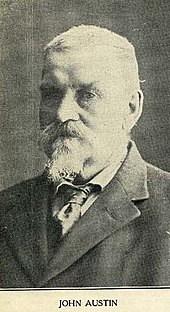John Austin (legal philosopher)
legal philosopher; (1790-1859)
John Austin (3 March 1790, Creeting Mill, Suffolk – 1 December 1859, Weybridge, Surrey) was a noted British legal theorist who strongly influenced Anglo-American law by means of his analytical approach to jurisprudence and his theory of legal positivism.

| This article about a philosopher is a stub. You can help out with Wikiquote by expanding it! |
Quotes
editJohn Austin, The Province of Jurisprudence Determined, 1832.
- The matter of jurisprudence is positive law: law, simply and strictly so called : or law set by political superiors to political inferiors.
- p. 1; opening line
- Since the term command comprises the term law the first is the simpler as well as the larger of the two. But simple as it is, it admits of explanation. And, since it is the key to the sciences of jurisprudence and morals, its meaning should be analyzed with. precision.
- p. 6
- A command is distinguished from other significations of desire, not by the style in which the desire is signified, but by the power or purpose of the party to inflict an evil or pain in case the desire is disregarded.
- p. 6
- Every positive law, or every law simply and strictly so called, is set, directly or circuitously, by a sovereign person or body, to a member or members of the independent political society wherein that person or body is supreme.
- p. 136-137
- To the ignorant and bawling fanatics who stun you with their pother about liberty, political or civil liberty seems to be the principal end for which government ought to exist. But the final cause or purpose for which government ought to exist, is the furtherance of the common weal to the greatest possible extent.
- p. 224
- The existence of a law is one thing, its merits or demerits is are another thing. Whether a law be, is one inquiry; whether it ought to be o whether it agree with a given or assumed test, is another and a distinct inquiry.
- p. 278
- Variant:
The existence of law is one thing; its merit or demerit is another. Whether it be or be not is one enquiry; whether it be or be not conformable to an assumed standard, is a different enquiry. A law, which actually exists, is a law, though we happen to dislike it, or though it vary from the text, by which we regulate our approbation and disapprobation.- John Austin, Austin Lectures on Jurisprudence; or The Philosophy of Positive Law, 1873, Lecture V
Quotes about John Austin
edit- Within a few years of his death it was clear that his work had established the study of jurisprudence in England.
- H. L. A. Hart, "Introduction to John Austin", in: The Province of Jurisprudence Determined, Weidenfeld & Nicolson, 1955, pp. xvi.